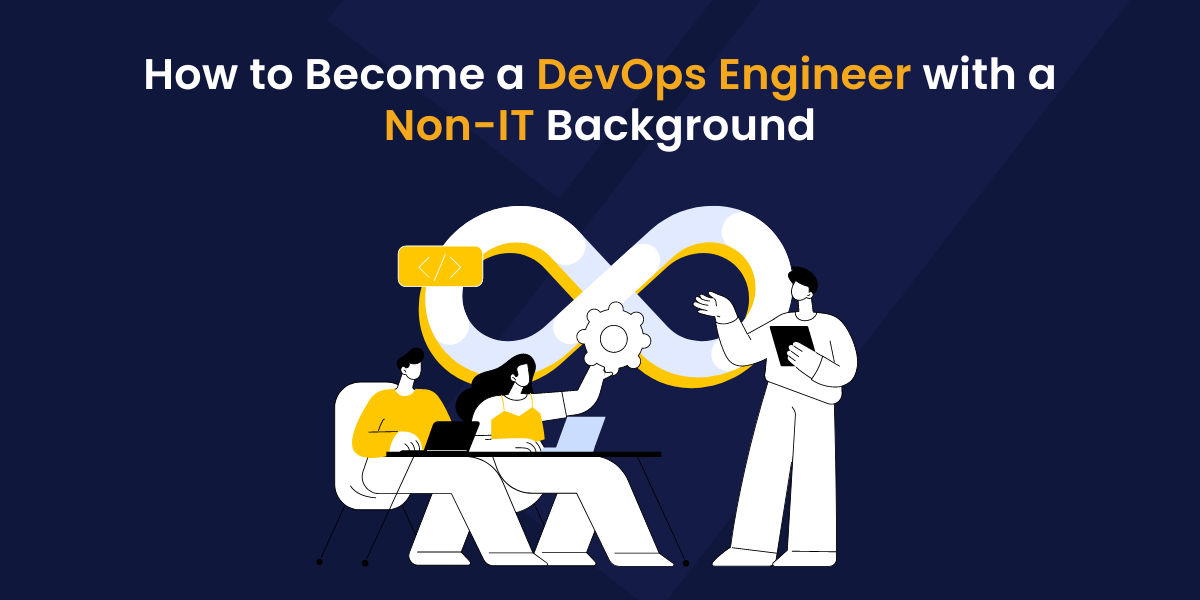DevOps is a method that combines development and operations teams to streamline software creation and deployment. It’s not just for IT experts anymore; even non-technical individuals can pursue careers in DevOps. If you’re not from an IT background but dream of being a DevOps engineer, this guide is customized for you.
Becoming a professional DevOps engineer without a coding background is absolutely possible, although it might require a bit more time and effort to acquire the needed skills. Here’s a breakdown of steps to guide you along your journey:
Understanding DevOps:
DevOps, a fusion of “development” and “operations,” represents more than just a methodology or set of practices. It embodies a culture of collaboration and efficiency between software development and IT operations teams. At its core, DevOps emphasizes automation, continuous integration (CI), continuous delivery (CD), and infrastructure as code (IaC) to streamline the software development lifecycle.
Assessing Your Skills:
Before delving into DevOps, it’s vital to evaluate your existing skills and areas for improvement. While technical expertise is crucial, soft skills like problem-solving, communication, and teamwork are equally essential in DevOps roles. Additionally, familiarity with programming languages such as Python, shell scripting, and experience with version control systems like Git can significantly enhance your prospects.
Gaining Technical Proficiency:
To excel in DevOps, it’s essential to grasp various tools and technologies commonly used in the field. Begin by acquainting yourself with configuration management tools like Ansible, Puppet, or Chef, which automate infrastructure provisioning and management. Additionally, learn containerization technologies like Docker and container orchestration platforms such as Kubernetes to efficiently deploy and manage applications.
Embracing Continuous Integration and Delivery:
Continuous Integration (CI) and Continuous Delivery (CD) lie at the heart of DevOps, aiming to automate the software release process. Learn to implement CI/CD pipelines using tools like Jenkins, GitLab CI, or CircleCI to automate building, testing, and deploying code changes. Mastering these practices facilitates delivering high-quality software rapidly while ensuring reliability and stability.
Exploring Cloud Technologies:
Cloud computing is integral to modern DevOps practices, offering scalability, flexibility, and cost-efficiency. Familiarize yourself with leading cloud platforms like Amazon Web Services (AWS), Microsoft Azure, or Google Cloud Platform (GCP). Understand cloud services such as compute instances, storage solutions, networking, and serverless computing to leverage the full potential of cloud technology in your DevOps workflows.
Adopting Infrastructure as Code:
Infrastructure as Code (IaC) is a cornerstone of DevOps, involving managing and provisioning infrastructure through machine-readable definition files. Learn popular IaC tools like Terraform or AWS CloudFormation to automate infrastructure creation and configuration. Treating infrastructure as code ensures consistency, scalability, and repeatability across environments.
Cultivating a DevOps Mindset:
Beyond technical skills, embracing a DevOps mindset is crucial for success. Foster a culture of collaboration, transparency, and continuous improvement within your organization. Encourage open communication between development, operations, and other stakeholders to eliminate silos and drive innovation. Remember, DevOps is more than just tools; it’s about people, processes, and a shared commitment to delivering value to customers.
Get Certified
Consider pursuing certifications such as AWS Certified DevOps Engineer, Docker Certified Associate, or those offered by the DevOps Institute. These certifications not only validate your skills but also demonstrate your dedication to mastering DevOps principles. They serve as tangible proof of your expertise to potential employers and can significantly boost your career prospects in the field.
Get Hands-On Experience:
Immerse yourself in hands-on projects to gain invaluable experience and deepen your understanding of DevOps concepts. Whether you’re working on personal initiatives, contributing to open-source projects, or participating in hackathons, practical experience is key. It allows you to apply theoretical knowledge in real-world scenarios, refine your problem-solving skills, and solidify your proficiency in DevOps practices. Additionally, consider getting hands-on experience with real-time projects at CloudZenix, an online DevOps course designed for beginners looking to transition their careers into DevOps. This platform provides practical, industry-relevant projects that complement theoretical learning, offering a comprehensive approach to mastering DevOps principles and techniques.
Engage with DevOps Communities:
Join DevOps communities both online and offline to tap into a wealth of knowledge and expertise. Attend meetups, participate in webinars, and join forums to connect with experienced professionals and enthusiasts. Engaging with the community provides opportunities to share ideas, seek advice, and stay updated on the latest trends and innovations in DevOps. By learning from the experiences of others and networking within the community, you can accelerate your learning journey and gain valuable insights into industry norms and emerging technologies.
Conclusion
Becoming a skilled DevOps engineer requires dedication and time. Start with the basics, gradually expanding your skills. While coding isn’t the main focus, learning scripting languages like Bash or Python for automation is essential. As you gain experience, specialize in areas that interest you. Engage in hands-on projects to apply your knowledge practically and improve problem-solving skills. Stay current with DevOps trends by continuous learning and community involvement. By being curious, adaptable, and committed to growth, you’ll advance steadily as a proficient DevOps engineer.

